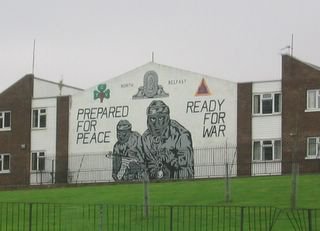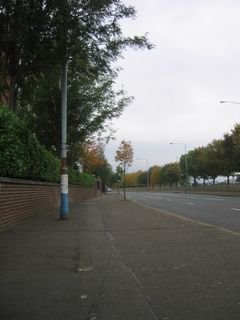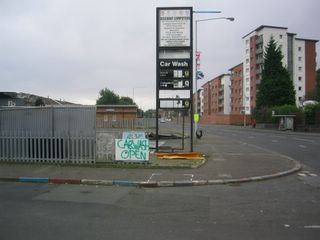Thanksgiving: A Day in the Life
This Thanksgiving Day was unlike any other in my life so far. I was a long way from home and family, and a long way from the traditional Thanksgiving meal and football. Yet as the day progressed I realized that I have so much to give thanks for here in Belfast. The entire day was a gift, from the first sounds of the morning when my iPod woke me with 40 Acres, to the last sound before I fell asleep, snow gently falling at my window.
Today was a normal day. Only on my walk to the bus did I realize it was Thanksgiving, and my mind was instantly filled with all the goings-on back in Jacksonville. Riding a bus alone, an ocean away from home, and thinking of your favorite holiday is not a healthy combination. Romantic, possibly, but not healthy. Thirty minutes later, I stepped off the bus, crossed the street and walked toward my church, thoughts absorbed with family, desperately trying to recall the smell of turkey and stuffing. I walked through the door and reality pierced through my dreams, in the form of greetings from the wonderful people at the over-50s cross-community lunch club. This morning my main 'job' (if you can call it that) is a ministry of presence, to simply "be" there-- learning names, sharing about myself and my experience, hearing their intriguing stories (they have seen so much!)-- essentially to form relationships with the pensioners. The first hour or two consists of me 'refereeing' games of indoor bowling, which despite the insistence of the players, doesn't actually need a referee. I'm more just there to share the "craic", which is Irish for 'conversation' or 'banter'. Today was more intense and thus more entertaining than normal. After challenging some of my calls, one granny demanded that I bring out the measuring tape, and everyone had a good laugh. With both Catholics and Protestants in the mix, its always good to see that competition can overcome sectarian differences. As one elderly woman commented, "its not the grannies who are out there throwing bricks- we all get on great!" And so it seems, at least at this lunch club, anway.
Over lunch I sat with two old men, Joe and Kevin, who always welcome me to sit beside them. They share a tragic connection, as both of their wives have passed on, which they talk about with surprising frequency. The difference between them is time; Kevin's wife passed more than a decade ago, while Joe lost his just last year. Kevin mostly offers his advice, because its really Joe who talks about it with surprising frequency. Every conversation with him will at least touch on the subject, and most revolve around it. The pain in his eyes is so clear, so piercing. After fifty years of marriage its no surprise that the loss is so consuming. But although I've thought about the possibility of it, I've never had to confront the reality and rawness of emotion when you have loved someone for half a century and then lose them. It is apparent that my friend Joe has been devastated by the loss. Yet he still agrees with Tennyson, "Tis better to have loved and lost than never to have loved at all." He says he wouldn't trade those years for all the pain he's in now.
And that makes me think. It makes Chesterton's claim more compelling, "The way to love anything is to realize that it might be lost." What can I say to Joe? More and more I have found myself in the role of pastor, listening to people who go through such hard times. But what can my twenty-two years say to that? What comfort can I offer? The reality is that time does not always heal these wounds, that it might not 'get better', that Joe's wife is not coming back. I can tell him that God feels his pain, that his wife is in Heaven and enjoying the joys and the rapture. Perhaps that will comfort him. Or perhaps its all a little abstract to Joe, who is the first to say that he never was much for going to church. This much is clear already: I do not deal well with death. I do not want to think about it. I do not know what to say when it happens. And I am absolutely terrified that I will lose someone I love.
With these thoughts swirling in my head, I went about the rest of my day, which usually revolves around teenage boys who never fail to challenge and entertain. I played and refereed football with the guys at the 174 Trust, engaging in conversation between games, slowly building friendships and trust. Normally I would have also gone to the Boys Brigade (BB) in the evening, similar to scouting back in the US. I play and referee football there too, and lead badge classes on camping. But today the BB Captain told me to take the night off, saying he couldn't make an American work on Thanksgiving. With all those thoughts still dancing through my mind and heart, I was grateful for the break.
And so I went home for dinner with my housemates, Kirk and Sandra. Just a normal dinner-- we'll have a real Thanksgiving meal at Doug's house on Saturday. I spoke with my family back home, which reminded me of my earlier thoughts, but was more comforting than I could have imagined. And then, out of the jet black sky, white specs appeared. There was no forecast of snow, but this is Belfast, and you never know what the weather will do. No doubt, it was snow, enough to run around outside and get pelted with snowballs by the neighborhood kids for almost an hour.
Indeed, I have so much to be thankful for, not simply the roof over my head or the food on my plate. Its mostly people-- people who know me and love me, people who share this bizarre and wonderful experience we call life. At the most basic level, I must be thankful for this life itself, which is such a gift. "The true object of all human life is play. Earth is a task garden; heaven is a playground," claims Chesterton. Snowballs and the delightful shouts of children reminded me today of the meaning of those words, with perhaps just the slightest glimpse of that place where the streets have no name, that big playground in the sky.





